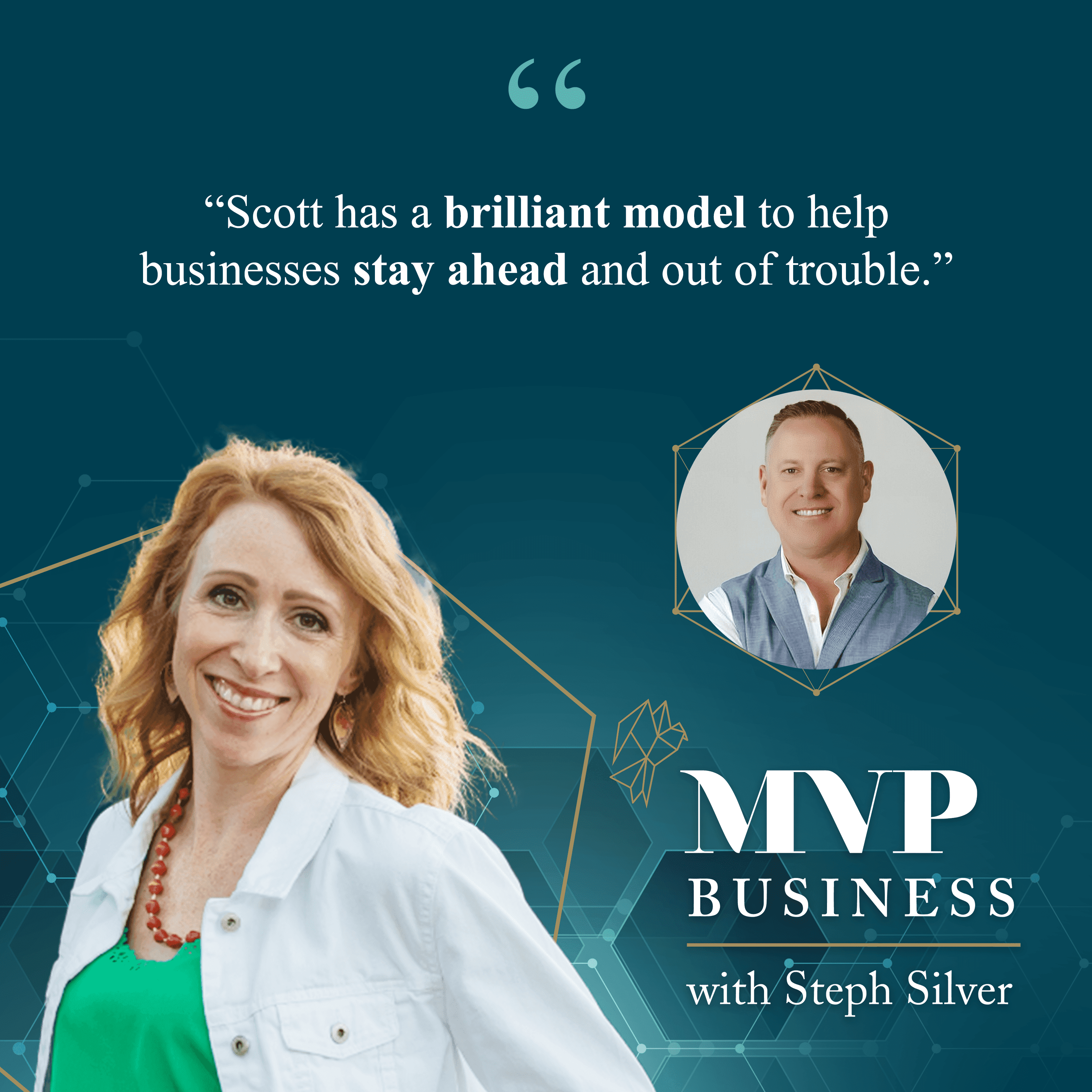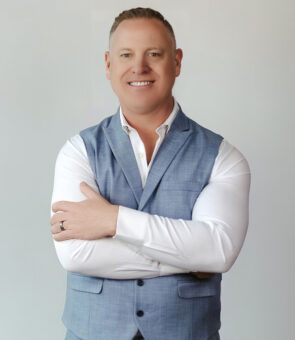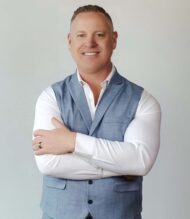Posted on November 6, 2023
Seeking legal advice doesn’t have to be intimidating or expensive if we treat lawyers like primary care doctors instead of ER doctors. This proactive approach to the legal aspect of business is what our guest brings to the table today. Scott Reib is known as America’s legal coach, and he is the official Zig Ziglar small business lawyer with over two decades of legal experience. In this conversation, Scott discusses a brilliant model to help businesses stay ahead and out of trouble. He also discusses the right approach to signing deals and contracts, the importance of recurring revenue for business, and more. Stay tuned to learn how you can shatterproof your business and be always one step ahead!
—
Listen to the podcast here
Advice From America’s Legal Coach, Scott Reib
Our guest is Scott Reib. He is known as America’s Legal Coach. He’s the official Zig Ziglar Small Business Lawyer, a Ziglar Legacy certified trainer, and he has over twenty years of experience as an attorney. For the last two decades, Scott has been helping business owners, entrepreneurs, coaches, and service providers to shatterproof their businesses and succeed in the professional World.
He is a firm believer that seeking legal advice doesn’t have to be intimidating or expensive if we treat lawyers like primary care doctors instead of ER doctors. Through his prescription-based access plan legal service, Scott is making great strides in shifting that perspective. We’re excited to talk to you, Scott. Thank you so much for joining us.
It’s my pleasure, Steph.
Let’s start with you telling us about how you became the Official Zig Ziglar Small Business Lawyer.
That’s a great story. In 2014, I was trying to find a niche in small business law. I didn’t want to just help everybody. I feel like I could help speakers, trainers, and coaches. The reason I like them so much was most of them, their mission in life was to help other people. I felt like if I was helping them, then my reach was exponential.

I started looking around for people who could help me, and I found a guy who was offering certification on how to become a lawyer for speakers and coaches. I paid the guy more money than I probably should have and went to the event. I learned a ton and was given an assignment to go to a live event and then bring that back to the group for our next group call.
I got back to Texas. Almost all the events were on the West Coast. There were tons of events over there, but I didn’t want to travel again. I’m like, “What’s in Texas?” The only thing I knew was Ziglar. Zig was Texas. I started looking around and I found an event in Houston that I could go to. It was a two-day event. I scheduled it. I got on Southwest. I flew to Houston and walked into a room where they were doing a Ziglar Born to Win event and was blown away.
I knew Zig. My dad was in sales. I was very familiar with Zig’s message and material, but had never seen his son Tom and it was amazing. The morning went great. I was excited about what I was seeing and we’re in Sugar Land out in the middle of nowhere at that point. Now, it’s all grown up, but there wasn’t anywhere to go to lunch. I’m talking to the front desk person. “I didn’t have a car. What do I eat?” He said, “There are some vending machines.”
Tom’s partner in that event, Howard Partridge was behind me and he said, “Do you need a ride to lunch?” I’m like, “That would be great.” He took me to lunch. We met with some of his coaching clients and then we come back and he’s like, “How are you going to the airport tonight?” I’m like, “I’ve got a card from the cab that brought me last night. I’ll call him.” He’s like, “No, Tom will take you.” I’m like, “Tom who?” He’s like, “Tom Ziglar.” I’m like, “Okay.”
We walked back into the room and he said, “Tom, you need to take Scott to the airport.” Tom was like, “Okay. I’m leaving at 4:45. Be ready.” I grabbed my suitcase and left it in the back of the room. I finish the afternoon and sign up for their coaching program. At that point, I’d be in three coaching programs and we get in Tom’s rental car in Houston traffic for an hour and a half. I got to ride around with the son of Zig Ziglar for an hour and a half and it was surreal.
He’s such a great guy and we’ve become really good friends. It was all of the Zig wisdom coming out of Tom who sounds very different than Zig but it was all the same. We get to Hobby Airport and we’re both getting on different planes to Dallas. I’m like, “I’ll probably never see him again.” I get back home and I start looking. I realize there’s an event in Dallas next week. I can’t go to the whole thing, but I could probably go to a part of it.
I finished up some things in court that morning and drove straight to the event in Dallas. I walked in at about lunchtime and they made a big deal about me being there. Howard asked me to take him to lunch. I did that. We came back and he started to introduce me to the Zig Ziglar team and the employees. They started asking me, “What do you do?” I start telling them and they’re like, “Tom needs someone like you.” I’m like, “I’d love to do that.” They’re like, “Let’s set up a meeting.” I’m like, “Okay.”
They scheduled a lunch for us to meet about two weeks ahead of schedule. I worked hard. I got my sales presentation together. I showed up for the lunch meeting, and we had a nice conversation for about half the lunch and then I asked him. I said, “Tom, would it be okay if I showed you my sales presentation? You guys were the sales guys. You can tell me what you think about it.” He’s like, “Sure.”
I get out my flip chart and start going sales presentation. I get to the end and say, “Tom, is there any reason you wouldn’t do business with me now?” He got quiet. He stopped talking. He said, “No, I’d love to. Send me an agreement and I’ll sign.” They came on to be one of the early adopters of our Access legal coaching membership.
Soon after that, I went through some training and I got to be a Legacy-certified trainer so that I can teach Zig’s courses. It’s been a great relationship ever since. They invite me from time to time to talk to their groups, do webinars, and things like that. I get to walk through life with Tom and help them as they build the next-generation Ziglar company.
That’s an amazing and incredible story. It’s interesting because you can get so many different things out of it. It’s a little bit of synchronicity, but one of the things that a lot of people don’t always hear in those types of stories is all of your willingness to step into the moment that was prepared for you. You went to the events. Right after a court appearance, you went to a half-day seminar. A lot of people would have said like, “I can’t make it. It’s too much. I just worked and I’m going to be there late. I don’t want to be late.”
You pulled out the sales presentation. That was brave. There’s so much in there that you were willing to step into. It wasn’t just this serendipitous thing that happened to you or for you. You stepped into all these opportunities. That’s fantastic, amazing, and incredible. I saw Zig Ziglar a long time ago and he was incredible. I can’t even imagine being right there in the room with family and being a part of that whole organization now. That’s fantastic.
How did you determine your business model ahead of time? You had a great sales pitch. You had a good business model that was different enough that everybody said, “You need to meet Tom.” How did you determine ahead of time that this was a model that worked for you that you thought was beneficial and necessary?
I’ve been practicing law for a long time. For the first ten years, I was doing all kinds of litigation. Some of it is fun but most of it is a drag and it’s not good for people. They’re spending lots of money that they shouldn’t and not moving forward. I started having a problem, or I realized I had a problem in 2012. People are coming with their houses on fire. I’d help them put it out. It costs a whole lot of money and time. We’d win, and then they would still have a bad taste in their mouth and they’d go away and make the same mistakes again.
I started scratching my head. “Why aren’t they calling me before they make those mistakes?” A lot of times, it was as simple as if any lawyer had looked at this contract before the party signed it, they wouldn’t have signed it. It could have been fixed very easily. The things that would cost a couple thousand dollars maybe to fix, they’re going to be spending $80,000 to $100,000 in litigation because no one was willing to spend the money.
The conclusion I came up with was that because the system is broken. Traditionally, since the ’50s, lawyers bill by the hour or by 6-minute increments. Anytime you get a few calls, email, or text them now, you’re getting charged money. Money is flying out of your pocket. There was a barrier between me and my clients. They would google it, flip a coin, or dial a friend before they would call the person who knew the answer.
I got to looking around and especially the coaches and things that I was seeing and working with were doing things differently. They didn’t charge you by the hour anymore like traditional consultants. They had packages where you could pay a monthly amount for a certain level of service. I’m like, “Why couldn’t that work for lawyers? What people need is legal coaching. They need to understand how to do this the right way to build a business that will bend and not break.”
I had this vision for an on-demand system where entrepreneurs could call at any moment and say, “I have a question. I don’t know if it’s a legal question but I have this question. This is in the meeting and they said this. What does it mean?” and not get charged money for that because they already had a set fee per month. After looking for a coach to help me do that, I went through a couple. I finally found someone who understood my vision and had a map for how to get me where I wanted to be. In 2012, on August 12th, out of Tulsa, we built what became the Access Legal Coaching Program.
What got you into legal in the first place and what makes you passionate about that legal accessibility?
I graduated from college in ’91 and the economy was bad. There weren’t very many jobs. I was a Marketing major. I would like to have been an advertising executive but there weren’t jobs back then for that. Also, marketing and advertising want you to do sales. They want you to sell copiers, phones, and insurance, anything but what I wanted to do. I worked for a major telecom carrier selling aftermarket phones to businesses. It was a good gig until they decided that they didn’t respect my contract and took my job away from me.
They put me into a territory that didn’t have phones so that I would go away. I went to see a lawyer and they said, “You got a case but you can’t beat this. There’s no way you can do this.” I was 23 years old and had no money and I couldn’t fight them. I did what any normal person would do. I went to law school. It was a combination of things. It was the right time to retool because the economy wasn’t great. I could see it was going to get better and I thought three years down the road, if I got more education, I’m going to be a lot better off and be able to support my wife and family.
We applied to law school. I ended up going to the University of Oklahoma. We’ve moved to Norman and my wife taught school. I went to law school and it was a great experience. School is so much better than work. You forget how great school is when you have so much more time. You have to work hard but not have to perform at a job. That was a great season for us and I learned a ton. I made some great relationships too but I learned a ton. I came out of school and wanted to be a litigator.
If you’re going to be in law, that’s supposed to be an exciting place because you could be in the courtroom. I soon figured out that you don’t get into the courtroom very often and you spend most of your time in meetings or teleconferences talking to experts in their field or whatever the litigation is. It was boring and I didn’t feel like I was helping people.
I kept trying to figure out, “Where can I help people more?” I have done several different things since the 2000s. The thing I liked the most was helping small business owners. I could make a big difference. Part of that came from in 2005 when I started my firm. I was in an office suite with other solopreneurs, people that were bootstrapping businesses and I got to see them. We’d have conversations. I was in networking groups but we’re all trying to grow these new baby businesses. I fell in love with that group of people who are trying to do their own thing and make this economy work.
I’ve had a similar thought process that I’m in marketing and advertising. I had to go through sales to get there. It’s such a weird journey but it makes sense because you know both sides of it if you go through that process. However, as I grew up, built a different agency, and started my own agency we all thought, “You want to get the bigger the biggest clients. You want to go after the big international corporations,” and all this stuff.
I understand that I do not. I love working directly with the business owners, the entrepreneurs, and the ones who are excited and passionate about making a difference and providing a good product. Also, they take care of their teams and do their part in the world. Working with corporations is like working with a machine. It’s so much more difficult and less rewarding. There may not be the big paper paycheck that comes in the door but it’s so validating and rewarding to work directly with people that you know you’re making a difference for.
Over the years, I’ve had several coaches. I almost always have been working with a coach telling me, “You need to increase your prices. You charge more. You need to work with bigger businesses.” I’m very resistant because the more I charge, the more money I make, but the fewer people I can help. We’ve tried to have our plans affordable enough that people can use them so we can help more people. I’m on a mission to help $10,000 small business owners shatterproof their businesses and to do that, I’ve got to keep my pricing affordable.
I’ve got to be on shows like yours, thank you very much for having me on, and on stages so that I can get the message out that there is a way to work with the lawyers that’s affordable. There’s a way to build your business in a way that it won’t crumble when something happens. It’s just a matter of time that you’re going to have some legal issue in your business and we need to be ready for it. I view lawyers and law firms as primary care, not emergency rooms.
There's a way to build your business in a way that it won't crumble when something happens. It's just a matter of time before you have some sort of legal issue in your business and you need to be ready for it. Click To TweetIf you’re spending time on the legal health of your business, it is the best vehicle to achieve your life goal or dream. You need to take care of it and spend some time understanding the legal aspects of business. It’s good stewardship and the way to run it. We’d love to partner with small business owners. We work with people who are startups. We stop at about $5 million or $10 million in revenue. They say $20 million is a small business. I’m not sure I agree with that. That’s not who I want to help. I want to help the people that are trying to figure this thing out and build these small businesses that feed other families but they’re 10 to 15 employees and not 100.
The $20 million could probably have in-house legal and that’s what you’re trying to do is have the ability to conceptually walk down the hall and ask a question. Tell me more so that everybody understands. What does it mean to you to the concept of primary care versus ER? I see it as holistic health as opposed to waiting until you break your leg or somebody asks you a big question and you mess up that contract. We’ll then get into, “What does it mean to shatter proof?”
You hit on one of the big ones. One of the biggest problems that we see is that people either aren’t using written agreements in their business or they’re using bad ones. The only thing worse than not having one is using a bad one and there’s so much bad information available on the internet that people are downloading forms and using things that aren’t quite right to make themselves feel better that they’re doing the right thing, and it causes them all kinds of problems.

Legal Advice: One of the biggest problems is that people either aren’t using written agreements in their business or they’re using bad ones.
We do legal coaching monthly with our clients. We’re having conversations about, “What have you done left a couple of weeks that we haven’t talked about? What’s coming up? What are you thinking about doing? What new products or services are you contemplating offering and what documentation can we build or legal structure can we build around that to make it safer for you to do that new thing?” It’s because most of our clients are very entrepreneurial so they’re always thinking of new ways to do stuff.
We then have to think of new ways to protect them. Building the contracts, building what we call the enterprise structure where we have the different organizations and LLCs. Maybe using corporations depending on how they’re doing it to find the best way to protect their business and their business assets. Also, protect their personal assets from all that business activity. The only way to do that effectively is to have an ongoing conversation with a legal team.
We’re talking monthly like this over a Zoom call or face-to-face and then there’s constant texting and emailing of, “Here’s the question. Here’s a document. Can you review that? We need this document,” and we’re creating it for them and they’re giving us feedback. It’s a constant back and forth, and by doing that, you’re getting that primary care. It’s much like fitness. If you wait to get fit until after you’ve had a bypass surgery, it’s a little late.
You can do it but it’s going to be a struggle and you’re never going to achieve the level of fitness that you would have if you took the time to go to the gym five times a week in your 30s, 40s, and 50s instead of waiting until you’re 65 and trying to figure this thing out. The question I get a lot is, “When’s the right time to hire a lawyer?” It’s now.
When's the right time to hire a lawyer? It's now! Click To TweetIn my mind when you said primary care versus ER, I’m still thinking of more of a traditional model where you wait until you have a question and then you go to the attorney. It would be more like insurance. If you have a question, you go to them. However, what you’re saying is so much more brilliant, especially for entrepreneurs who are constantly thinking of new ways.
Entrepreneurs are dreamers. They’re not only small business owners. They’re constantly coming up with things that change the game on a regular basis. Even if you are a bakery, you never know what’s going to come your way and who’s going to slip and fall, new contracts for real estate, or whatever it may be. What you’re saying is you have a set schedule, where you say, “What’s going on with you right now? What are you thinking about? What are you changing? Who are you hiring? How are you communicating?”
From there, you have recommendations and possible changes for their business that help to keep them. This is more like a fitness and nutrition coach where ahead of time you’re saying, “What are your goals? What are you trying to do? Are you trying to be in a triathlon or are you just trying to be healthy?” That’s the different paths we’re going to go on. That is brilliant. Congratulations. Do you have a team of people or attorneys that are all coaches?
I’ve got a team built up of some employees because there are some positions where there have to be employees. We have contract lawyers, for instance, who will help us on a project basis. The hard part about this brilliant idea is delivering it in a way that I can make money. You have to be conscious of the cost and how you’re filling these needs. We’ve done a pretty good job over the last many years of figuring out how to do it efficiently so that the clients are getting the service they need on a timely basis.
It’s not costing me an arm and a leg to provide it and I still have freedom in my life to have fun. Otherwise, I don’t have a business. I have a job. I’ve got a team that I can be gone for a month and all the projects will keep moving forward. Everyone would get great service the way we’ve got it built. We leverage a lot of technology to do that but it does take a team to do it.
That’s a good point for all business owners as well as the concept of your lifestyle versus job. If you go into business, it’s to create your own business. It’s not so that you can work 80 hours a week.
That’s been hard because if you love what you’re doing, you’ll spend a lot of time doing it. Sometimes, you’ll convince yourself that you’re indispensable and you have to be there. You’ve got to be at the office from 7:00 to 7:00. It’s probably not true. Over the last couple of years, I’ve started focusing more attention on trying to take care of myself and building my life the way I want it to be.

Legal Advice: If you love what you’re doing, then you’ll spend a lot of time doing it and sometimes you’ll convince yourself that you’re indispensable and you just have to be there.
My schedule is very non-traditional. I don’t know any other lawyers that work the schedule I work. I do work hard when I work but I’m at the gym five days a week. I’m not an early morning person so I don’t go to the gym early in the morning. If it doesn’t work for me, I won’t go. I go at 9:00, and I’m at the office at 10:30.
I had a sleep expert on the show and he was talking about how, especially on entrepreneurs, we listen to all these things about, “You have to get up at 4:00 in the morning and go to the gym, do this and do that,” or whatever. He’s like, “That doesn’t work for everybody. It can be detrimental to your whole process if you try to live by somebody else’s sleep schedule. If it’s not your own.”
He went into a business and worked with a woman who was getting ready to get fired. She was failing at her job. Through communication, he talked to her boss, “How about you let her come in at 10:00 AM and stay until 7:00 PM and do the same exact job but maybe the meetings are at different times?” The bosses are hitting. He’s like, “What do I have to lose? I’m going to fire her and a couple of weeks anyway.” He changed her schedule and everything changed.
As entrepreneurs, we have that choice, but we don’t necessarily think we do. Thank you for bringing that up. It’s just like everything else. We have the ability to create our own worlds when we realize the power that we have. Speaking of that power, we’ve said this term shatterproof your business several times. What does that mean to you and what are some of the suggestions or some of the tools that you give to people to put their business in that place?
The concept in the simplest terms is we want to bend and not break. The concept came from the glass in our car windshields. Your business is your vehicle to achieve your life goals and dreams. You’ve got this windshield and the windshields there for two reasons. It’s for visibility and protection. We’ve got to have that made in a way that it’s not going to hurt us and that we can see through it. They make it out of this fancy glass that’s got layers so that when a rock hits it, it marks it. It doesn’t come through and hit you in the face and you can keep driving down the road until you get through your destination then take care of that.
We’re trying to build businesses in that same way that if a demand letter comes in and they say you’ve done something wrong, it’s marked your windshield. We continue the rest of the day, then we communicate with our counsel that this has happened. We’ve built our legal systems and structures in a way that we’re not panicked because they can’t get to our assets and they can’t shut us down. We’re not scared so we’re operating from a place of peace and power instead of fear.
By building your structures, your entity structure, your contracts, and your employee arrangements, and making sure that you’re not misclassifying people, for instance, you become what we call shatterproof. One of the guides we have is Is Your Business Shatterproof? That’s available to all the readers. We’ve got a special page set up on the website, ReibLaw.com/MVP-Business.
It’s got instructions for how you can get that eBook free and you can book a laser legal coaching session with me where we can talk about your business. I can give you some insight on some things that you could change to get closer to being shatterproof. That’s the general concept and it’s been something we’ve been working on since 2012.
Every year, we had more and more to the idea, and part of being shatterproof is what you do. It has a marketing plan and marketing system. It’s not all about the legal stuff. You also have to have a marketing system and a sales system. You need to have a good back office system for tracking your money. There are all these things that go into running a business that’s not going to get knocked off the tracks.
You mentioned that the consultation would be directly with you. How do you go about determining which attorneys are on your team and that they’re following the same mindset and processes that you have in your concept of what’s right?
We have a mission statement and we have core values that we go over a lot and that they’re familiar with. I spend a lot of time with them making sure they understand how we would do things. We have systems and structures in place for them to do it. Everything’s getting reviewed by employees as it comes back through us to make sure that it’s meeting the quality that we want. They’re answering the questions in the way that we’re supposed to because one of our core values is we make legal simple.
We make legal simple. Click To TweetWhen I interview lawyers to be part of our program, they have to agree with that concept. Some lawyers, for whatever reason, think they have to overcomplicate everything and they’ll create contracts that no one in their right mind would sign. That’s not good for business. We’re trying to help our people grow their businesses. Many deals look good and are fair, but have enough teeth in them to protect everybody.
It’s through the interview process and then sometimes, people aren’t a good fit. We figure it out pretty quickly and move on. I’ve got people now that we’ve been working with for a few years that are fantastic. They don’t just do documents. They’re talking to our clients on a regular basis. They understand how we’re trying to help them and appreciate the model. They don’t always get it but we’re able to do the interview process to figure that out. Any business needs to have its mission statement and core values so that you can keep everyone on the right track.

Legal Advice: Any business needs to have their mission statement and core values so that you can keep everyone on the right track.
That’s a core tenet of this show as well. Everyone on the team needs to align with, understand, and live through your mission, vision, passion, and your core values. You talked about contracts and making them as clear but protective. What are some of the things that business owners should ask themselves before signing or putting a contract out for someone else to sign?
That’s a great question. The first thing you should do anytime you have a contract, if it’s on paper, is have a pad next to you. On the top of the paper, you write, “What do I want out of this contract?” so that you understand what the goal is. What are we trying to accomplish? Look at the contract. When you read the contract, does it achieve that goal?
Another thing to think about is, “Does the contract take me towards my mission or away from my mission?” It’s because if it’s not helping you accomplish your mission, why are we doing this contract? Sometimes we get busy doing business. People present us with ideas and they are shiny so we start looking at contracts. Make sure that it’s doing the thing that you need it to do. That’s the first thing.
The second thing is you want to go through and look at all the dates. What I teach our people to do is take a yellow highlighter, go through it, and highlight all the dates. You have to make sure that all those dates match up to what you thought they were going to be and that you can live with them. Can you live with performing on these dates if you have to do something? If they’re doing something for you, is it okay to do them on those dates? Also, make sure all the dates are right.
The next thing you want to do is go through the different color highlighters and mark all the money or all the time there are dollar signs. We’re looking at, are the dollar signs right? Do they have the numbers right? From whatever phone call or emails we had to lead up to this contract, does it match our understanding of where the dollars are supposed to be? Again, are we okay with it?
If we’re receiving the money, is it the right amount? Can we live with that? If we’re paying money, we need to make sure that we can afford it and that we can pay it when we’re supposed to pay it. Now, we’ve made sure that it’s taking us on the right track. The deadlines are all good. The money is good. You’re well over halfway to a contract that’s solid.
The next thing you want to look at is, “What are my rights, duties, and obligations? If you’ve got a handful of highlighters, just mark it. What are the things I have to do? Am I okay with that? Can I do those things?” If you can’t, you’re setting yourself up for failure. The next thing is, “What are the things they have to do? Do I think they can do them?”
If you pass that test, you move on to the next test which is, “How is our dispute resolved?” I would suggest that every contract you sign should have a mediation clause in it so that there’s at least a buffer between you and the court. If you want to do arbitration, you can. I would get educated on arbitration because it can be very expensive, but you want to have something between you and the court. Mediation is a good process of being able to resolve disputes without having to spend a lot of money in litigation. You want that in your contract. If it’s not there, ask them to add it or kill the deal.

Legal Advice: You want to have something between you and court, and mediation is a really good process to resolve disputes without having to spend a lot of money in litigation.
You want to make sure that it’s got what state laws govern this contract and where would a dispute be resolved. If you look at those five things, you’re well on your way to what I would call a shatterproof contract. I will say that anyone reading this is smart enough to do that process. However, if you haven’t been to law school, you don’t have the nuance and experience to interpret some of the things in a contract that may seem simple to you. You’re much better off having a lawyer look at it.
However, if you go through this process, before you give it to your lawyer, if they’re billing by the hour, you’re going to save a bunch of time because you’ve done a bunch of the work for them and you’ve made sure that in your mind, this is a deal that you need to do. It’s because the worst thing would be to spend money on a contract that you would have known was dead on a rival had you gone through that process. I would encourage you to use those steps but in conjunction with a legal counsel that you have a relationship with and understands what you’re trying to do, the context of your business, and the deals.
Go through that process, know what you’re clear questions are, and then you can reduce the number of hours that your attorney is going to spend on it. On the flip side, do all the same things when you’re putting a contract out for someone else.
You bet. You can create a contract very easily in an email if you cover those five points and then have someone reply, “Yes, that’s the deal.” You’ve got an enforceable contract. Is it the best contract? Maybe not but if you go through those steps, and there’s more those are some of the major steps you want to do and putting together any agreement.
One of the things that I was thinking as you were talking through that and this is hard for small businesses, but always be willing to kill the deal right there. If it’s not going to meet all of those needs and expectations, even if the one thing is it doesn’t meet your mission, that sometimes is the most important reason to kill a deal. It’s going to take you off track, which may take you completely away from all of the things you started working for.
Don’t fall in love with the deal. Look at it objectively. That’s why having a system like that helps because it makes you more objective you may be excited about it for some reason but back off. Look at it from a different perspective and don’t be afraid to say, “No, I’m not signing that.” There’ll be other opportunities and deals.
Don't fall in love with the deal. Look at it objectively. Click To TweetAnother thing that you believe is that all businesses should have a recurring revenue stream. It’s obvious that it’s beneficial but why is that such a strong foundational belief for you?
In the summer of 2014, I lost all of my team. They all left for various reasons and it was just me. It was an event. It didn’t happen over time. It happened quickly. I was suddenly in a 2,500-square-foot office space with no employees and just me. However, because I had a recurring revenue stream, I realized very quickly that I wasn’t in this as bad a spot as I thought I was because all my payroll had gone away. My cost went to almost zero.
I had recurring revenue coming in every month no matter how many people were working for me. I just had to figure out how to deliver the service. If I had not had that, other than reserves, I would not have been able to pay rent. However, because I thought that system, I knew there were certain dollars coming in, and every month, it grew by adding new people to the program. I was very stable from a financial standpoint.
Without it, I can remember the years before that. The first of the month I’d walk in, it’s like, “How are we going to pay the bills this month?” With the recurring revenue, you don’t feel that pressure. When you don’t feel that pressure, you’re operating your business from a totally different perspective. Desperation is good to a point. It can drive you to start a business and to build a business but at some point, it’s very difficult to sell any kind of services or products when you have to have the money.
If you’ve got this system set up where some part of your business is month over month, you have revenue coming in that mailbox money that you’re not having to send an invoice to get. It just comes in through a subscription, then from what I’ve seen in my life and with other companies that have adopted that model, it’s huge. We talked about this Ziglar company and Tom talked about these mistakes so I can talk about it.
He had written a new book and they were trying to design the program for it. Their typical programs were people would come in and pay $10,000 to go through a three-day program on getting certified in whatever they were doing, which was okay. However, when I looked at it and drew out a program plan for him to turn into a recurring revenue model in late 2019, it changed everything. They were going to deliver it in a virtual way so they didn’t have to use their event space and spend all that money, and COVID hit.
They not only had recurring revenue and made much more money than they could have made with the one-time event fees, but they were able to deliver it through the pandemic in a way that they’d never been able to before. You have to think about business differently and find some component that if not your whole business has that recurring revenue model and is maybe even delivered in a way that’s different than your normal service. It’s smart to be diversified a little bit, not only in your products but in how your money comes in.
Even if it starts off as an undercurrent that’s the stable base the foundation, I agree with that. It’s game-changing to know even if your expenses are 10X with that revenue model, at least, you know that this small little bit is going to be consistent or fairly consistent and has the ability to grow as opposed to having to constantly be in hunting mode in order to pay your bills.
I found that when I’m not hunting, a lot more business comes my way.
It’s a mindset and energy component, which is probably what put you in that place, in the beginning, to get into the Ziglar program to begin with. You’re in an open space and a growth mindset as opposed to a fear mindset, which pushes everything away. Nobody wants to come into a place of fear.
They can feel it.
Unfortunately, there’s no way to cover that up. It radiates quite intensely. What advice would you have for someone who is thinking about starting their own business or is retooling their business and wants to go out and do something big from an entrepreneurial standpoint?
If you’re going to start something new, you need to have a couple of professionals who are helping you do that. You need to have a coach. You need to have an accountant or CPA and you need to have a business lawyer that understands the entrepreneurial journey. You want to present your vision to those professionals and take feedback from them that can you design that plan.

Legal Advice: If you’re going to start something new, you need to have a couple of professionals to help you do that.
I went to business school and they taught us how to do these elaborate business plans. I don’t suggest that you do that but you need to have what I would call a 90-day game plan for, “This is what I want to do and this is what I’m going to do in the next 90 days and what I expect to achieve in those 90 days.” I’ll show that to those professionals and if everyone agrees that’s a good plan, then let’s get a legal entity set up so we at least have the protection from our personal assets.
We have an LLC in place and a bank account inside the LLC. We make some minimal investment into the LLC and that’s the risk that we’re going to take. Let’s go through that first 90 days and let’s see where we are. We set the goal for the next 90 days. I found that if you live life and the business life in 90-day chunks, you’ll be very successful. If you start right now, “I want to start a business,” and you start doing a 3-year or 5-year, you’re going to get lost in the weeds.
Come up with your idea and come up with a 90-day plan. Every plan has to have a goal or an objective and it should be a dollar amount that you want to achieve in sales. It should probably also have a number of customers or clients that you want to have come into your business during that time to equal these dollars. It becomes a math problem but that’s what I would do and you need to have those trained professionals to do that well. Can you do without them? Sure, but if you want to do it well and make your chances of success higher, that’s how I would do it.
Thank you for that. There’s so much power in two sides of what you’re talking about. One, the 90-day plan does keep things pretty simple and gives you something to hold yourself accountable that is achievable. Also, writing it down and getting it out of your head makes it not just concrete there. It’s changing the whole perception of it. Those three relationships are going to see your 90-day plan from a completely different perspective and there’s so much power in that.
Even if you don’t have them on retainer if there’s some way that you can get them to go in for these 90 days, look at it, be your advocate, and your partner. You take their feedback with an open mind and heart knowing that when you start a business, it’s your baby but are you going to listen to grandma when she tells you this is the way to keep the baby healthy?
Thank you so much for all of that information. It’s true and valuable. The first thing I did when I started my business was get a business coach. I thought, “That’s expensive. I’m not sure if that’s something I’ll maintain forever,” and it is the thing that I can’t. Every week, I don’t know what I’m going to say when I go into the call, and then I leave the call with, “I can’t believe I didn’t think of all those things.” He thinks about it completely differently. I love having a business coach, an attorney, and a CPA looking at all the different major angles from completely different points of view. You mentioned a resource, can you tell us that URL again?
It’s ReibLaw.com/MVP-Business. If you go there, you can book a free schedule with me. There are instructions for how you can get Is Your Business Shatterproof? the free eBook. If you want a 90-day game plan worksheet, if you DM me on Instagram @TheScottReib, I’ll send you a PDF 90-day game plan that you can use to start your business.
Thank you so much. That is so helpful. Thank you so much for all of the information, your business model, and your thought processes. It’s fantastic and brilliant. I think that this is a business model, an attorney relationship model that everyone should have.
Thanks, Steph.
Thank you for all the insights. Any last wisdom to the world you want to shout out?
This has been a pleasure to be here with you. Remember, if you are a business owner, you may feel like you’re alone but you’re not. Get plugged into some networking groups and get some friends who are in the struggle with you because you are much more likely to be successful if you’re hanging out with other people who are striving for things like you are.
You are much more likely to be successful if you're hanging out with other people who are striving for things like you are. Click To TweetThank you so much. Thank you to our show supporters, Tower Commercial Real Estate, and VINE Collective. I want to also thank our readers. If you like it, tell your friends and follow us on Instagram or LinkedIn. The mission of MVP Business is to dig deep into the lives of true leaders so that others can follow, knowing that the path isn’t always easy but the journey is worth it. Enjoy the day and live with passion.
Important Links
- Scott Reib
- Access
- ReibLaw.com/Mvp-Business
- @TheScottReib – Instagram
- Instagram – VINE Collective
- LinkedIn – VINE Collective
- Tower Commercial Real Estate


